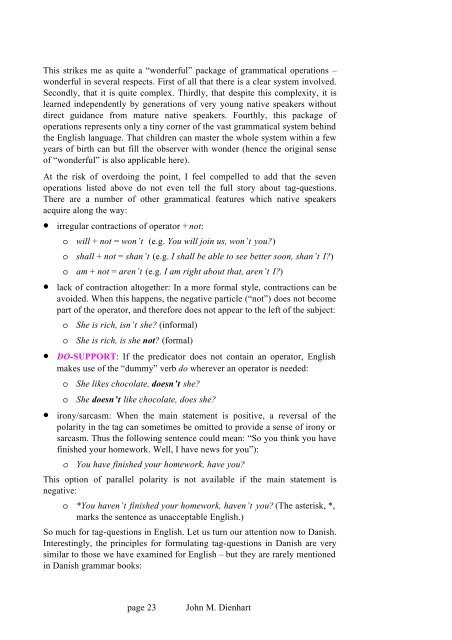Download - VISL
Download - VISL
Download - VISL
Create successful ePaper yourself
Turn your PDF publications into a flip-book with our unique Google optimized e-Paper software.
This strikes me as quite a “wonderful” package of grammatical operations –<br />
wonderful in several respects. First of all that there is a clear system involved.<br />
Secondly, that it is quite complex. Thirdly, that despite this complexity, it is<br />
learned independently by generations of very young native speakers without<br />
direct guidance from mature native speakers. Fourthly, this package of<br />
operations represents only a tiny corner of the vast grammatical system behind<br />
the English language. That children can master the whole system within a few<br />
years of birth can but fill the observer with wonder (hence the original sense<br />
of “wonderful” is also applicable here).<br />
At the risk of overdoing the point, I feel compelled to add that the seven<br />
operations listed above do not even tell the full story about tag-questions.<br />
There are a number of other grammatical features which native speakers<br />
acquire along the way:<br />
• irregular contractions of operator + not:<br />
o<br />
o<br />
will + not = won’t (e.g. You will join us, won’t you?)<br />
shall + not = shan’t (e.g. I shall be able to see better soon, shan’t I?)<br />
o am + not = aren’t (e.g. I am right about that, aren’t I?)<br />
• lack of contraction altogether: In a more formal style, contractions can be<br />
avoided. When this happens, the negative particle (“not”) does not become<br />
part of the operator, and therefore does not appear to the left of the subject:<br />
o<br />
She is rich, isn’t she? (informal)<br />
o She is rich, is she not? (formal)<br />
• DO-SUPPORT: If the predicator does not contain an operator, English<br />
makes use of the “dummy” verb do wherever an operator is needed:<br />
o<br />
She likes chocolate, doesn’t she?<br />
o She doesn’t like chocolate, does she?<br />
• irony/sarcasm: When the main statement is positive, a reversal of the<br />
polarity in the tag can sometimes be omitted to provide a sense of irony or<br />
sarcasm. Thus the following sentence could mean: “So you think you have<br />
finished your homework. Well, I have news for you”):<br />
o<br />
You have finished your homework, have you?<br />
This option of parallel polarity is not available if the main statement is<br />
negative:<br />
o *You haven’t finished your homework, haven’t you? (The asterisk, *,<br />
marks the sentence as unacceptable English.)<br />
So much for tag-questions in English. Let us turn our attention now to Danish.<br />
Interestingly, the principles for formulating tag-questions in Danish are very<br />
similar to those we have examined for English – but they are rarely mentioned<br />
in Danish grammar books:<br />
page 23<br />
John M. Dienhart
















